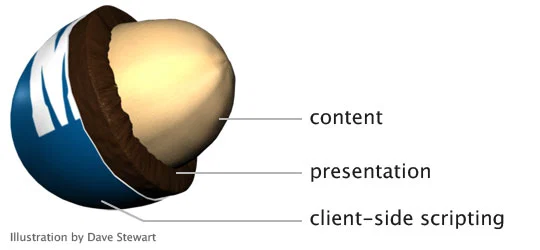Progressive Enhancement and/or Graceful Degradation

Progressive Enhancement
It is the idea of organizing feature development so that "(...) [web application] SHOULD look better in different browser" (21:25), in an attempt to create "The best possible experience given the device capabilities" by leveraging Native APIs, because otherwise we’re "trying to make older browsers do things they were never meant to do is the reason [that web development] takes too long" (26:55)
Graceful Degradation
In Web Development, this would be the equivalent of Defensive programming, where we would tell at least an error message if a required dependency is missing.
Escalators are a good example of graceful degradation — when they break down, they become steps.
Related videos
Is Progressive Enhancement Dead Yet?
Heydon (the author of that video) makes good points about how, in 2020, we should re-think how we build web applications. How we can now detect and load code paths only when applicable.
Since I'm publishing this file in the desire to have a long-term storage of my ideas, I will maybe find a way to quote and attribute properly here.
If it's many years past 2020 (crazy year that was!), if you saw a funny video that mentioned Tony Hawk and a shark with a fez talking about Progressive Enghancement, that's the video I wanted you to see!
You can see more very insightful videos from The videos are hosted on vimeo, but published from https://briefs.video/ and I can't unfortunately do anything more than link to his video talk "Is Progressive Enhancement Dead Yet?"
The new 📼 Webbed Briefs 📼 video is now ready for your “““enjoyment”””!
Source
The author is Heydon Pickering (Yes, to see his site, you’ll ave to turn off JavaScript — what a cool idea!).
Progressive Enhancement 2.0
Quotes:
- "Your site SHOULD look better in different browser" (21:25) At least for modern browser, "The best possible experience given the device capabilities" which explains bugs are caused by "trying to make older browsers do things they were never meant to do"
- "Less code is always faster" (29:05)
Reference
- Progressive Enhancement 2.0, Nicholas C. Zakas talk at YUI Library conference, 2012-03-19
- Understanding Progressive Enhancement
- In defence of graceful degradation and where progressive enhancement comes in, by Adam Silver, 2019-06-25